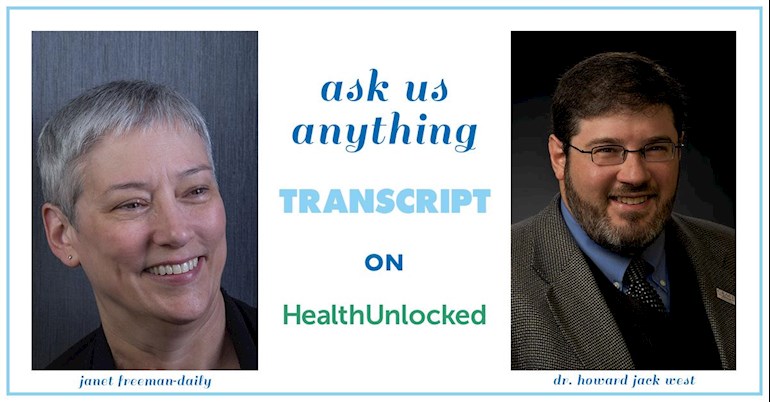Hello everyone and welcome to the 2nd Free to Breathe HealthUnlocked Ask Me Anything event! We also want to welcome our very special guests Dr. Howard Jack West and Janet Freeman-Daily.
Go ahead and start typing your questions as a reply in this thread below. You can either ask a question to both of our guests, or you can ask Janet directly by tagging her with @JFreemanDaily, or ask Dr. West by tagging him with @JackWestMD
Once our experts see your comment, they will reply back. To know if they replied to you, simply refresh the page and you will see an orange indicator next to notification button at the top of the page (the bell icon). NOTICE: This is just a text conversation; no video or audio needed!
Once our hour is complete, this thread will be locked so that no more questions will go through, so be sure to ask your questions before the event is over!
More about our experts:
Dr. West has published numerous articles in peer-reviewed literature and has authored several book chapters. He also now serves as the Web Editor of JAMA Oncology and is on the editorial boards of Journal of Clinical Oncology, Journal of Medicine, Clinical Lung Cancer, and Journal of Thoracic Disease, in addition to serving as an author of multiple lung cancer-related sections of UpToDate and as a reviewer for more than a dozen professional journals. Dr. West leads a wide range of clinical trials and has been actively involved with the SWOG Lung Cancer Committee as a Study Coordinator/Principal Investigator. Dr. West founded and continues to serve as President of the nonprofit organization Global Resource for Advancing Cancer Education (GRACE), a source of timely, free information for patients and caregivers dealing with cancer that currently receives over 50 thousand visits per month from over 100 countries around the world. Dr. West is also working to develop telemedicine-based practice patterns to broaden the range of treatment options for cancer patients through the Swedish/Providence network.
Janet Freeman-Daily, MS, ENG, was diagnosed with advanced non-small cell lung cancer (NSCLC) in May 2011. After two chemotherapy regimens and two radiation protocols, her cancer became metastatic. She used information obtained in online forums to get her tumor tissue tested for newer molecular markers and find a clinical trial, and has had No Evidence of Disease since January 2013 thanks to precision medicine and social media.
After applying her MIT and Caltech engineering degrees to a career in aerospace systems engineering and new business for two decades, Janet now is a patient activist who uses her communications and science background to translate the experience of lung cancer treatment and research for others. Her advocacy work includes writing an award-winning blog at grayconnections.net, co-moderating Lung Cancer Social Media (#LCSM) Chat on Twitter, serving on local and national cancer research and working groups (among them National Cancer Institute, President’s Cancer Panel, and University of Colorado NCI SPORE), leading the Global ROS1 Initiative (ros1cancer.com) with other patients, and speaking at oncology and medical conferences.
Thank you all for participating and enjoy the event!
